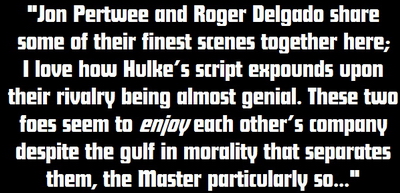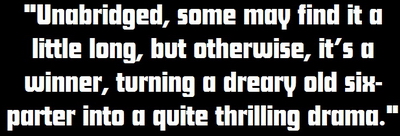|
| ||
|
PRODUCTION CODE HHH
WRITTEN BY MALCOLM HULKE
DIRECTED BY MICHAEL BRIANT
RATINGS 8.5 MILLION
WORKING TITLE THE COLONY
RECOMMENDED PURCHASES 'COLONY IN SPACE' DVD (BBCDVD3381) RELEASED IN OCTOBER 2011;
AND BBC AUDIO CD (ISBN 1-4056-779-50) RELEASED IN SEPTEMBER 2007.
BLURB The Time Lords discover that the Master has stolen secret information about a device called the Doomsday Weapon and realiSe they need the exiled Doctor's help. They send the TARDIS, along with the Doctor and his assistant Jo Grant, to the bleak planet Uxarieus in the middle of the 25th century where all is not well. WHAT IS ATTACKING THE COLONISTS AND CAN THE DOCTOR STOP HIS OLD ENEMY FROM FINDING THE DANGEROUS WEAPON BEFORE IT IS TOO LATE? |
| |
|
|
|
|
|
Colony in Space 10TH APRIL 1971 - 15TH MAY 1971 (6 EPISODES)
It was only a matter of time before the production team had to free the Doctor from his exile. Script editor Terrance Dicks has always been open about his disdain for the format that he and his producer, Barry Letts, inherited - he feels that it lent itself to only two types of story: “alien invasion” and “mad scientist”. And so Malcolm Hulke’s Colony in Space would be the first of several tales that would see the Doctor and Jo manipulated by the Time Lords into carrying out some sort of task in which they could not be seen to be act themselves. From this serial until the start of the tenth season, the third Doctor would enjoy a fairly even mix of Earthbound adventures and outer space capers as an (often unknowing) puppet of the high-collared hypocrites that exiled him.
“Don’t worry, Jim’ll fix it.”
Regrettably Colony in Space serves as a cruel reminder of why the decision was taken to make Doctor Who an Earthbound show – the series’ budget simply couldn’t stretch to designing and building exotic and credible alien environments. Young director Michael Briant, aided and abetted by his eager assistant floor manager, Graeme Harper, did his level best to find the “ultimate quarry” and fill it with it innovative new motor vehicles to try and create the sense of an alien vista, but unfortunately the effects of their laudable innovation were offset by the colour recording’s unforgiving highlighting of the production’s shortcomings. It didn’t help that Briant didn’t know how the TARDIS was supposed to materialise.
The supporting cast is almost as inspiring. Fans of British soap operas will notice the now-infamous Helen Worth of Coronation Street fame playing Mary Ashe, as well as a young Tony Caunter (Roy off Eastenders) appearing as Morgan. The standouts though are Bernard Kay and Morris Perry, who play Caldwell and Dent – two of the most frighteningly human antagonists that you’re likely to find in the series. It’s difficult to imagine one of them being played by a jack-booted woman though, but apparently that was what Briant had in mind – at least until the powers above dismissed the idea as being “kinky”.
“Are you aged between thirty-five and fifty? Do you like digging for rocks? Do you hate hippie colonist scum? If you answered ‘yes’ to all the of the above, and you look good in a helmet, then you may be in luck... IMC needs you!"
Such snippets of trivia are easily gleaned from the DVD’s bonus material, which supplements the serial’s six episodes with a twenty-five minute feature, IMC Needs You! This retrospective ‘making of’ documentary is imaginatively packaged inside a cartoon avatar-strewn spoof recruitment film, and is carried largely by the vivid memories of Graeme Harper, who seems to look back on Colony with real fondness and enthusiasm. This zeal is mirrored in the disc’s vivacious commentary track, which he shares with his former director; Katy Manning; Terrance Dicks; Bernard Kay; Morris Perry; and referee Toby Hadoke.
Colony in Space
is a striving serial that still boasts more positives than it does
negatives, but is probably best enjoyed today on an episode-by-episode
basis. Whilst Hulke’s narrative sustains itself well in terms of its meat,
its dawdling pace doesn’t lend itself to back-to-back DVD viewing. The
disc’s extras package, meanwhile, is by no means the most extensive that 2|entertain
has ever thrown together, but it is at least equal to the serial that it
complements.
|
||
|
Copyright © E.G. Wolverson 2008, 2012
E.G. Wolverson has asserted his right under the Copyright, Design and Patents Act 1988, to be identified as the author of this work. |
||
|
Doctor Who and the Doomsday Weapon
Hands up who secretly loves Target novelisations? Yeah, me too. I’m not even someone who can claim to have grown up with them; they turn up in charity shops fairly often, and, well, they’re Doctor Who! Even so, they’re more often than not a load of old tosh; speed-written fluff to read in your lunch break. Some of them, however, are really rather stunning. They’re generally the novelisations that were released fairly early in the range, or at the very end; the ones when the authors were given leave to expand the original scripts to fit their own vision.
Malcolm Hulke’s novelisation of his own serial, Colony in Space, is one such triumph. It’s not the greatest novelisation, but it’s rather impressive. The serial itself, transmitted in 1971, was dull and talky, and was realised on screen in a rather pedestrian fashion. With his imagination given free reign, unconstrained by production budget or serial structure, the story is much improved.
Firstly, looking at the product itself, it’s a very attractive package. Jeff Cummins’ classic cover illustration is used, with Delgado’s Master imposingly looking out from the centre. However, we’re given a choice - Chris Achilleos’ original cover from the 1974 first edition is on the inside front, along with the US Pinnacle edition, and the Dutch, Japanese and Turkish editions (Doktor Kim ve Gizli Silah!) We also get Achilleos’ original internal illustrations reproduced in the CD booklet; though one small niggle is that these are very small – couldn’t we have had a few more pages in the booklet and given them the space they deserve?
Geoffrey Beevers gives a skilful reading of the text. His calm, measured delivery works well for a prose reading, and he gives a good variety of subtly different voices for the various characters; if there’s a complaint, it’s that his voice for the Doctor sounds too much like his general reading voice. What we’re waiting for, of course, is the Master. It’s a small age before he turns up, but when he does, he’s well portrayed. Beevers gives us the calm, chilling version of the Master that we’ve gotten to hear in his occasional Big Finish outing. Although the Master is described as per his Delgado appearance, it’s broad enough to imagine that this is the Beevers incarnation, prior to any horrific immolation. He’s a creepy, threatening foe.
Altogether, this is a gripping novel. Unabridged, some may find it a
little long, but otherwise, it’s a winner, turning a dreary old six-parter
into a quite thrilling drama.
|
||
|
Copyright © Daniel Tesier 2008
Daniel Tessier has asserted his right under the Copyright, Design and Patents Act 1988, to be identified as the author of this work. |
||
|
Unless otherwise stated, all images on this site are copyrighted to the BBC and are used solely for promotional purposes. ‘Doctor Who’ is copyright © by the BBC. No copyright infringement is intended. |
||

.jpg)
.jpg)
.jpg)
.jpg)
.jpg)
.jpg)
.jpg)
 Colony in Space
Colony in Space.jpg)
.jpg)
 Getting to the story itself,
it’s very well told, a huge improvement on the televised version. Given
room to flesh them out, dull characters such as Ash, the colonists’
leader, and Captain Dent, the IMC CEO,
become believable and interesting to hear about. We spend a long time
getting to know both the colonists and the IMC crew - and Dent’s a real
bastard in this version. Still, we also hear about his life before
captaining the ship, and get a taste of the corporate horror of IMC;
hearing some of this, perhaps it’s no wonder he’s a bit twisted.
Getting to the story itself,
it’s very well told, a huge improvement on the televised version. Given
room to flesh them out, dull characters such as Ash, the colonists’
leader, and Captain Dent, the IMC CEO,
become believable and interesting to hear about. We spend a long time
getting to know both the colonists and the IMC crew - and Dent’s a real
bastard in this version. Still, we also hear about his life before
captaining the ship, and get a taste of the corporate horror of IMC;
hearing some of this, perhaps it’s no wonder he’s a bit twisted. .jpg) There are
some major differences to the transmitted version. For example, Jo Grant –
who actually gets less characterisation than many guest characters – joins
the Doctor at the beginning of the book. As this was the very first novel
featuring her, Hulke made this her introductory adventure. Another
alteration is the nature of the Exarian natives (slightly archaically
referred to as primitives within). They’re described entirely differently
to what we saw on screen – the general populace have bright yellow hair
and painted bodies, there are otter-faced robed priests and a doll-like
elder Guardian. We get a look at how Hulke originally saw his vision.
There are
some major differences to the transmitted version. For example, Jo Grant –
who actually gets less characterisation than many guest characters – joins
the Doctor at the beginning of the book. As this was the very first novel
featuring her, Hulke made this her introductory adventure. Another
alteration is the nature of the Exarian natives (slightly archaically
referred to as primitives within). They’re described entirely differently
to what we saw on screen – the general populace have bright yellow hair
and painted bodies, there are otter-faced robed priests and a doll-like
elder Guardian. We get a look at how Hulke originally saw his vision.